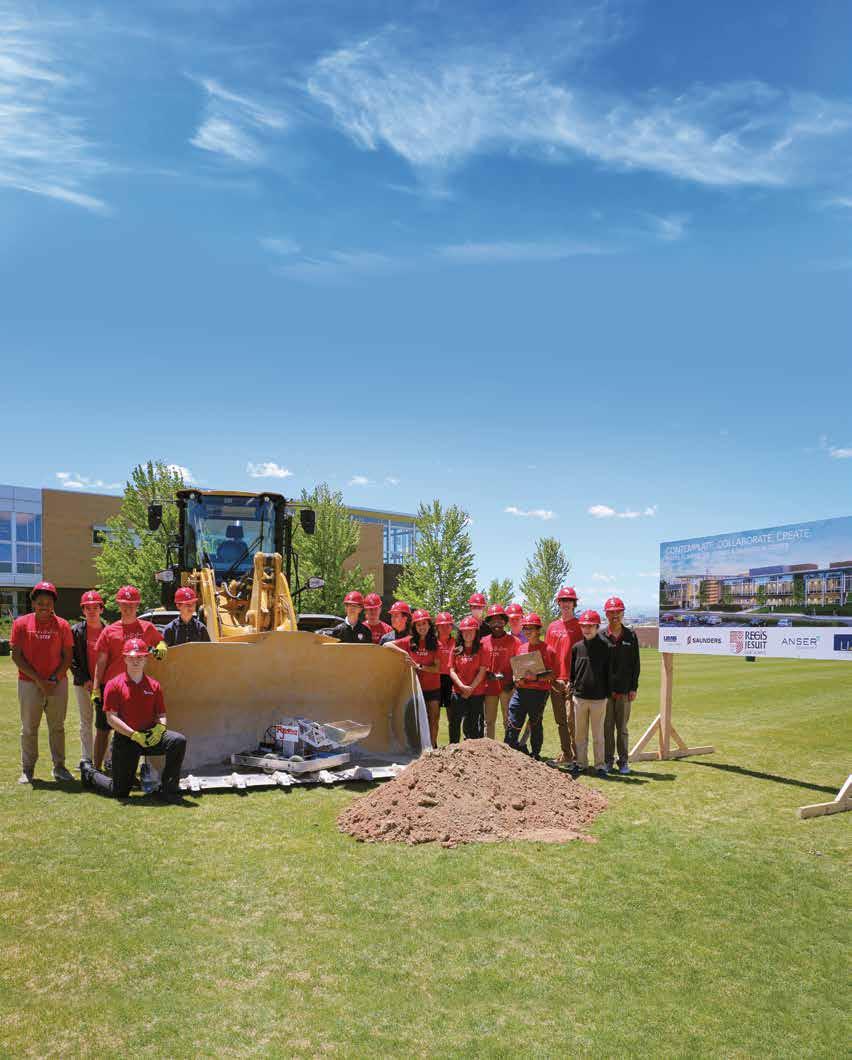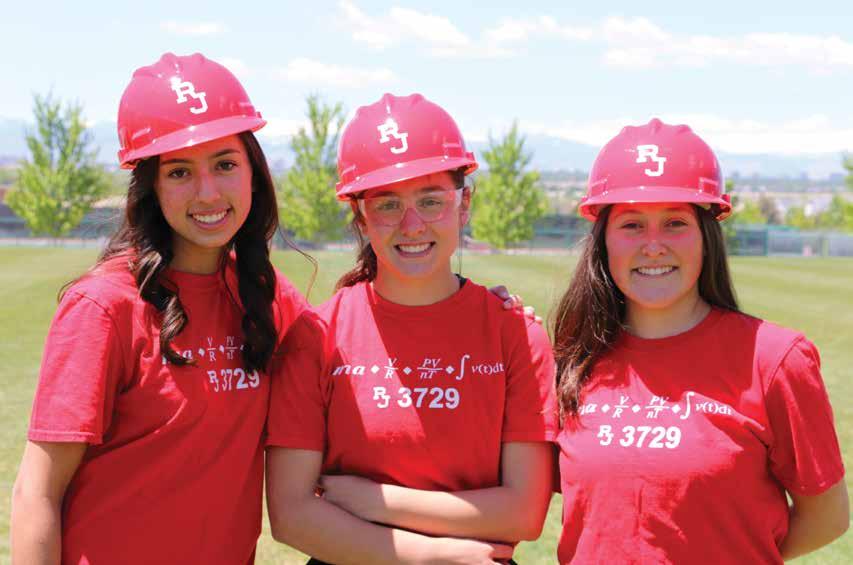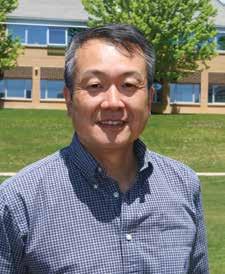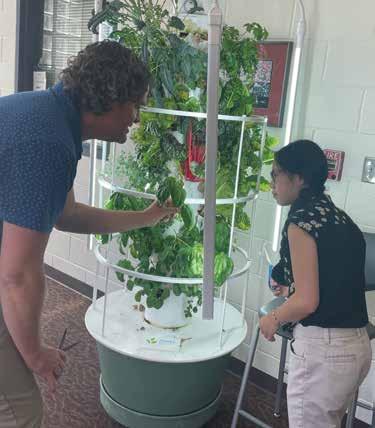
7 minute read
Future Science & Innovation Center
SCIENCE & INNOVATION CENTER Breaking Ground!
Robotics students have programmed their robot—fondly called DigBot— to help break ground on the future Science & Innovation Center.
DIG IN TO LEARN MORE
Learning by Doing Is Taking Off at Regis Jesuit
Some might say that designing the future Science & Innovation Center “wasn’t rocket science.” But they haven’t looked inside.
With dedicated labs for science, flexible classrooms for collaboration and group work, and an 8000-square-foot Innovation Center, the 65,000 square feet of state-of-the-art space will provide a central home for applied learning at Regis Jesuit. With studio art space, a new home for RJ Media and journalism and a chapel for reflection, students will have room to create and reflect as never before.
And with highly visible offices for both Admissions and RJ Connect alumni programming, the building will become a new front door for visitors, taking the campus to the next level—just as the Steele Center did when it opened in 2014.
Saunders Construction Inc. is the general contractor for this project and anticipates the building will take 18-24 months to complete. Meanwhile, school leadership will ensure the project stays front-and-center with stakeholders. In August, along with a celebratory groundbreaking ceremony, Regis Jesuit will launch a community fundraising initiative to fund successful completion of the Science & Innovation Center, while continuing to generate support for upcoming funding priorities of Inspire & Ignite 2025 (See page 13). Students will have opportunities to engage in elements of the building's construction to leave their own mark, and teachers will introduce new courses and programming that ultimately will move to the Science & Innovation Center.
Dig in and learn more »
www.regisjesuit.com/ScienceInnovationCenter

ROCKET SCIENCE COURSE:
George Mitsuoka, Director of the Innovation Center
Giving Teaching and Learning a Boost

Rocket science will be among the new creative, hands-on subjects offered this fall designed to foster critical-thinking skills and project-based learning in teams.
“Rocket science exemplifies the vision I have for programs in the Innovation Center,” says George Mitsuoka, Director of the Innovation Center. A graduate of MIT, Mitsuoka joined Regis Jesuit last summer after nearly four decades in industry as an engineer, manager and magazine editor. He now teaches graphic design, moderates the Robotics and Rocket Clubs and is overseeing planning of the Innovation Center, a key feature of the Science & Innovation Center.
“Studying rocket science will inspire students, teach them skills and build their confidence through accomplishment,” says Mitsuoka. “And because rockets are the perfect example of technology that can be used for both great achievement and great destruction, students will be asked to consider their own purpose when they apply their newfound skills. They will learn a sense of personal responsibility to serve others with the skills they have learned.”
Rocket science classes will be taught by a professional rocket scientist who spent decades in the industry building orbital rockets. Students will have opportunities to design rockets using computer-aided design tools and build them with advanced techniques such as 3D printing and composites manufacturing.
Mitsuoka also aims to attract a growing number of female students to rocket science, robotics and other applied sciences. “We will highlight the achievements of women in the field and bring in current and former female leaders, engineers and hopefully even astronauts to speak with and further inspire our students.” Regis Jesuit's FIRST Robotics Team, which had its best-ever finish at Regionals this spring, placing 11th out of the 41 teams competing, will find a new home in the Innovation Center, where club members will have easy access to the center's co-located workshop, computer lab, classrooms and practice field. Presently, the club's 30 members meet and work in rooms spread throughout the Boys Division and the Steele Center.
Isabelle Zuick ’24, who serves as president, is one of three girls on the team along with Arianna Morroni ‘24 and Elena Medina ’24, who also has a leadership role. “Our unique single-gender learning Zuick says, “In Robotics, we are model creates opportunities for our learning many hands-on skills, as well as ‘soft skills’ like presentations young women and men to explore and outreach events at schools and their curiosities and confidently apply events in the Denver Metro area. their skills. They are free to develop We work a lot with our team, so communication is a major learning solutions to real-world problems experience with all our members.” rooted in our faith.” Boys and girls work together on sub—Dustin Dvorak, Chair and Faculty, Science Department teams specializing in programming, CAD, building and electrical work. The programming sub-team creates code that tells the robot what to do. In CAD, they map out visual specifications. The build group works with handheld tools and machining equipment to cut materials for the robot. And the electrical sub-team mounts the wires that help complete the function of the robot, from moving at a specific time, to putting a shovel in the ground. “Robotics is very important because it is a field and a curriculum that females have historically not pursued, and have been discouraged from pursuing,” said Zuick, who is considering a career as a firefighting pilot. “I love that robotics encourages creative as well as critical thinking, which is important for any future endeavor.”
Zuick (right) is one of three girls on the Robotics Club team along with Arianna Morroni ‘24 and Elena Medina '24
SUSTAINABILITY COURSE: Engaging Students in Solutions for Our Global Community
Another new course coming to RJ this fall will be Sustainability: Environment, Economy and Equity, created by Kevin Russell, who also teaches AP Biology and Honors Biology. While the course represents a new and comprehensive way of teaching students to design projects and think through and create solutions for complex issues, it also shows how the Science & Innovation Center creates opportunities for teachers to explore their own passions more deeply and inspire students to join them in the discovery process.
“When Pope Francis released Laudato Si’ in 2015 on care for our common home, I started to realize the bridge that could exist between science and Catholic Social Teaching,” says Russell, who traveled to Peru in 2017 as part of the Carmelite NGO that built cross-curricular coursework for Catholic schools.
“I see this as a great opportunity for students at Regis Jesuit to explore environmental concepts by looking at who are the vulnerable people and how are they impacted disproportionately.” The semester-long course for rising juniors and seniors will include three six-week-long units addressing water, food and energy.
“The course is designed to be project-based, so we’ll have speakers come in and we’ll build partnerships with local, national and global groups such as Aurora Water and CSU Spur, a new educational destination for science and research in Denver." Teams of students will be partnered with experts and people on the ground who will share their perspectives. Many of these partners will be alumni of Regis Jesuit.
This approach will lead students to design and produce what Russell calls “self-directed action items”—from business plans, podcasts and ad campaigns to affordable water purification systems or more efficient irrigation. Students will present their projects to expert panelists and other stakeholders. He says the ideal student for the course will be motivated, compassionate and entrepreneurial. “They’ll have a passion for the environment; they’ll be interested in the economics of the issues; and they won’t be afraid to use their voice to ask questions and push for what they believe."
Russell says, “To me, this is the most exciting aspect: seeing what ideas students develop. I see my role as a guide and partner for the students, inspiring passion and providing them with opportunities to explore their bold ideas. And as we approach these complex issues facing our communities, we will always bring it back to the Jesuits' Universal Apostolic Preferences of walking with the poor and disenfranchised, caring for our common home, showing the way to God and accompanying our youth in building a hope-filled future.”

Many of RJ’s new applied-learning courses—from the natural and hard sciences to studio arts, media and more—will draw alumni back to campus to share their expertise and mentor our students. To get involved through RJ Connect, contact Paul Miller ‘04, Director of Alumni Relations, at pmiller@regisjesuit.com. And learn more about our RJ Connect programming on page 20.
To work with students in Robotics or Rocket Science, contact George Mitsuoka at gmitsuoka@regisjesuit.com.
To partner with the Sustainability: Environment, Economy and Equity class, contact Kevin Russell at krussell@regisjesuit.com.



